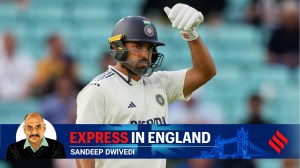DU prepares for first 4-yr batch under NEP 2020, student-teacher ratio, infra, timetable among key concerns
Under the NEP 2020, the fourth year offers students three specialisation tracks —Dissertation Writing, Academic Projects, and Entrepreneurship
 The university had implemented a four-year undergraduate programme in 2013 but it was scrapped (File)
The university had implemented a four-year undergraduate programme in 2013 but it was scrapped (File)It’s a race against time for Delhi University as it prepares for the fourth year under the Undergraduate Curriculum Framework 2022 (UGCF-2022). This is the first time that students will undertake a four-year undergraduate course under the National Education Policy 2020.
It, however, is not the first time that DU will implement a four-year undergraduate programme. The Four Year Undergraduate Programme or FYUP was first introduced in 2013 and scrapped a year later following widespread protests by teachers and students.
Meanwhile, students and teachers at the university can now look forward to longer days, with the varsity and colleges planning to offer classes till late in the evening, officials said. This is being done to make sure that the extra batch of students can be managed with the existing infrastructure. While the new framework, aligned with NEP 2020, allows greater flexibility and research-oriented learning, the lack of clarity regarding faculty, infrastructure, and student interest continues to divide the stakeholders.
Under the NEP 2020, the fourth year offers students three specialisation tracks —Dissertation Writing, Academic Projects, and Entrepreneurship. The first is designed for those considering academic research, the second focuses on applied research, and the third aims to guide students through market research, business development, and financial planning.
Under the new framework, a student can earn a certificate after completing one year of college, a diploma on completing two years, bachelors (honours) in one core subject or a bachelor (multidisciplinary) in different subjects. The fourth year will earn students bachelors (honours with research) or bachelors (honours in multidisciplinary courses).
For students who want to pursue a dissertation in the fourth year (Honours with Research), Research Methodology as a General Elective (GE) course must be taken in either Semester VI or VII. This would provide a foundation, however, students choosing any of the other two specialisation tracks in the fourth year need not take this. There are also Discipline-Specific Elective (DSE) requirements, as per the UGCF framework. The university has also revised its definition of Generic Electives (GEs), expanding course selection flexibility.
“From Semester 5, all students of BA (Programme) can opt for GEs from the open pool other than that of the core disciplines they are studying,” a university notification states.
Special provisions have been introduced for students who did not study Hindi up to Class 8. The amendment specifies: “Students of BA (P)/ B Com (P) with two non-language core disciplines, and who have not studied Hindi up to class 8, shall be allowed to opt for GE from the open pool if he/she cannot be provided GE (L) of their mother tongue. However, the principal of the college shall have to seek permission for the same.”
A similar provision “may be made for students from South India or the Northeast who do not have the proficiency to study the GE (L) Hindi prescribed for those who have studied Hindi up to Class 8. Further, those who have not studied Hindi/Modern Indian Language up to Class 8 may also be exempted from studying the second language of GE(L),” the document outlining the framework states.
To accommodate the increased academic load, the university plans to implement longer class hours as suggested by the University Grants Commission (UGC).
A senior DU official told The Indian Express, “We are going to implement the optimum utilisation of infrastructure as suggested by the UGC from 8 am to 8 pm. The labs might be an issue as they function only till 4 pm, but their timings will also be extended. Every student will have a mixed timetable, holding classes in the evening too on several days of the week to make sure that all credits are covered in the timetable.”
Ajay Arora, Principal, Ramjas College, said, “There was a misconception among students that they need a CGPA of more than 7.5 to enter the fourth year but that’s not the case. The promotion criteria remain the same from the third year to fourth year, as it was from first to second and second to third. We cannot ascertain the number of students who will opt for the fourth year but the university will offer this to any eligible student… Some universities are already running the fourth year of their courses.”
Talking about the challenges, he said, “The college infrastructure is designed for a three-year program. Extending to a fourth year would require significant adjustments, including increased utilisation of resources like classrooms. This will change the college’s working culture…”
Arora added that this would result in reduced flexibility in student schedules, as timetables would need to be adjusted to accommodate increased academic requirements.
Meanwhile, Anju Srivastava, Principal, Hindu College, said, “There’s a degree of uncertainty surrounding the fourth year, and we’ve done a round of queries, but there’s still room for clarification. The response so far from the students has been lukewarm, partly due to the timings.”
“Students in social sciences seem to be showing more interest… with at least sixty or more per cent of students wanting to continue to fourth year because of the research methodology aspect being offered…But the science students are preparing for their Master’s programmes and are unsure whether to continue or prepare for IIT.”
Meanwhile, Delhi University Teachers’ Association president AK Bhagi said research project requirements at the undergraduate level would be unmet because of a lack of UGC special grants. “Currently, DU doesn’t seem to be prepared for the fourth year,” he said, adding, “There are no teachers for the fourth year who are sanctioned to date. DU colleges have not been given teaching positions in lieu of EWS expansion of student strength in 2019.” According to Bhagi, there should be a comprehensive review of the batch to make the fourth year relevant.
Karuna Singh, a third-year BA Political Science (Hons.) student at DU, spoke about divided student opinions, stemming from a lack of clarity on syllabus, as well as guidelines. “The complete syllabus is still not available, and we’ve only been told that a research subject in the fifth semester is necessary for a foundation,” said Singh.
“Some of my batchmates plan to take competitive exams after the third year, while others will prepare for CUET PG. I’m part of a third category of students — fascinated by the idea of doing research with graduation…but we’re apprehensive about whether the syllabus will match the MA first-year curriculum.”
Talking of the prevailing uncertainty, she said, “We are the first NEP batch until we experience this ourselves…we can’t say anything. This one year could be problematic or innovative – only time will tell.”
For students considering postgraduate studies abroad, uncertainty is even greater. Some universities, particularly in the US and UK, have started accepting students with a three-year UG degree. “I was planning to apply for a Master’s abroad, but now I don’t know if staying for the fourth year will help or delay my chances,” said a student.
To accommodate the fourth-year students, the Hindu College Principal said, special arrangements are being made. “By April-end, we’ll start preparing the timetable that will require speculative planning and calculated risks. We need to make arrangements for varying student numbers, adopting a more open-minded approach. Considering the 13 to 14-week semester duration, we will face challenges with teacher-student ratios, requiring innovative solutions under NEP framework,” she said.












